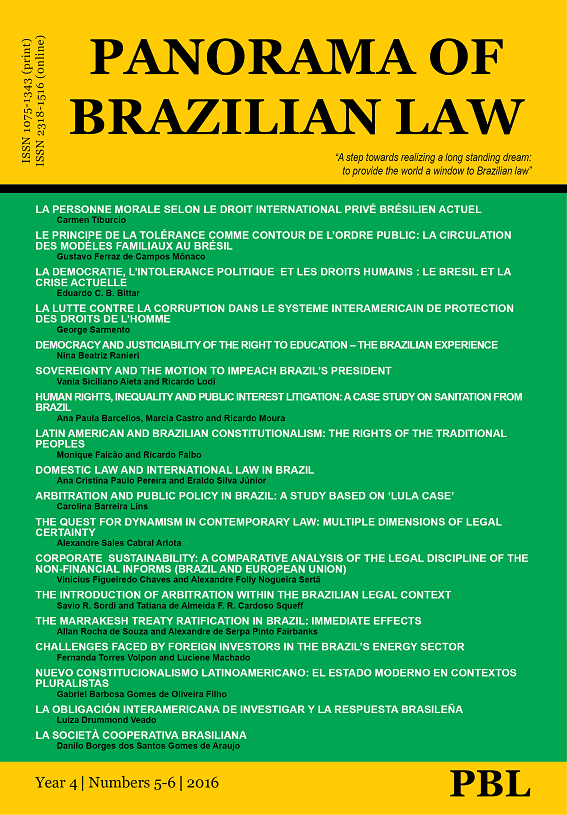ARBITRATION AND PUBLIC POLICY IN BRAZIL: A STUDY BASED ON ‘LULA CASE’
DOI:
https://doi.org/10.17768/pbl.y4.n5-6.p223-264Abstract
This work examines the subject of jurisdiction and arbitrability of issues related to energy and natural resources in the world, in order to enhance the arbitration institute in Brazil. The study is based on a recent case pending in Brazilian courts, named “Lula case”, which refer to a dispute between the State and concessionaires that grant the right to explore and produce oil and gas in a determined area. The presence of arbitration clauses in the concession contracts for exploration and production of oil and gas in Brazil raises questions related to the disposability of the rights concerned. It is paramount to set benchmarks on arbitral tribunals’ power to decide on these matters and to define to what extent arbitral awards may defy public policy, national sovereignty over natural resources and national courts’ jurisdiction to render decisions in this regard. Otherwise, the randomness of judicial decisions makes the arbitration clause ineffective. Moreover, the Lula case arises substantive issues related to the necessity to protect investors in the oil and gas industry, since acts arguably connect to the State policy power may cause damages to the private parties. The work critically examines the decision given by national courts so far and proposes an international approach to face situations involving the State and the necessity to protect investors in the oil and gas industry.Downloads
Published
2017-05-31
How to Cite
Lins, C. B. (2017). ARBITRATION AND PUBLIC POLICY IN BRAZIL: A STUDY BASED ON ‘LULA CASE’. PANORAMA OF BRAZILIAN LAW, 4(5-6), 223–264. https://doi.org/10.17768/pbl.y4.n5-6.p223-264
Issue
Section
Articles
License
Panorama of Brazilian Law employs Open Journal Access policies.
Authors are fully and exclusively responsible for their submissions.
Authors who publish with this journal agree to the following terms:
- Authors retain copyright and grant the journal right of first publication with the work simultaneously licensed under a Creative Commons Attribution-NonCommercial-ShareAlike 4.0 International License that allows others to share the work on a non-comercial basis with an acknowledgement of the work's authorship and initial publication in this journal and indicating if any changes were made. If you remix, transform, or build upon the material, you must distribute your contributions under the same license as the original.
- Authors are able to enter into separate, additional contractual arrangements for the non-exclusive distribution of the journal's published version of the work (e.g., post it to an institutional repository or publish it in a book), with an acknowledgement of its initial publication in this journal.

